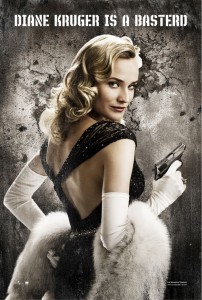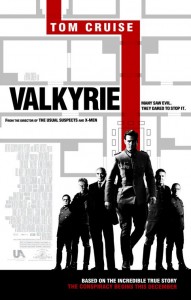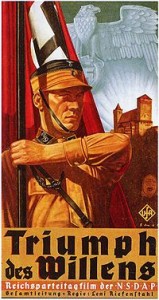Revisionist Cinema from Hell
Inglourious Basterds

She is watching us… the Voyeur as Killer
A Revisionist look at World War 2 with all the German angst, French charm and American parody…
Sooner or later Tarantino was bound to approach the territory of the 2nd World War. While there has been a plethora of World War movies since the mid 1940s onwards, many have tackled the War from a purely Euro-American perspective focusing on the Nazi’s simply as the enemy. From Great battle films, like Saving Private Ryan to the more personal and heart-rendering stories of Sophie’s Choice and Schnindlers List and more recently Atonement.

The Rot started from within…
Valkyrie arrived, Tom Cruise’s fascinating yet doomed project about a plot to kill Hitler from within the highest rankest of the Nazi inner circle in 1944. Defiance followed, a superb story of Polish Jewish resistance set in the forests outside Krakow. There was entertainment rumblings from Tarantino that after the Kill Bill films, he was planning a revisionist and slightly parodying version of World War 2…
Cannes Film Festival 2009

Cannes Film Festival 2009 and Inglourious Basterds, Tarantino’s long awaited film featuring a band of Jewish American Nazi scalp-hunters who take revenge on the Nazi’s in German-occupied France in the early 1940s is premiered much to every cineaste’s delight. Basterds is far more than a revenge cult film against Nazi’s, it’s a statement about Cinema being used as propaganda. The references are rife, for as in Pulp Fiction, Tarantino’s best trait is revealed, a rambling but significant knack for quirky dialogue. Except in this film, authenticity dictates –so naturally the French spoke French, the Nazi’s spoke German and the Americans spoke a range of regional accents from Brooklyn to Tennessee slang. Tarantino assembles some fantastic European stars of contemporary cinema, from Til Schwieger to Diane Kruger and Melanie Laurent.
Cinema as Propaganda
Tarantino makes comparisons between Joseph Goebbels – Nazi Minister for Propoganda and the then founder of MGM, Louis B. Mayer, both as masters of cinema and naturally propaganda. More specific are the references to Leni Riefenstahl, who rose to fame in the 1930s as a significant German film-maker churning out the Nazi blueprint for propaganda – Triumph of the Will.

Truimph of the Will
Riefenstahl, was later vilified once the war was over and went onto to become a documentary filmmaker in East Africa. There are also a sprinkling of humorous discussions about the American black athlete Jesse Owens who sparkled at the 1936 Berlin Olympic Games much to Hitler’s dismay. Watch out for a spoof on the British military featuring a contemplative Winston Churchill and a wonderful cameo by Mike Myers whose line, “we will have all the rotten eggs in one basket” is delivered with affected panache.
A French Spaghetti Western Tarantino Style
Basterds opening shots are reminiscent of the early spaghetti Westerns of Sergio Leone – with a scene straight out of The Good, The Bad & The Ugly, except its not a dusty Mexican outback with outlaws escaping bounty hunters, it’s a pastoral scene of a French Farming countryside. This time there is no Sun-Burnt Clint Eastwood in a poncho. Enter Christoph Waltz, the urbane, elegant and lethal multi-lingual Nazi Jewish hunter. Waltz has some of the best dialogue in the film and effortlessly switches from German to French to English in order to ascertain his victims whereabouts. Yet Tarantino presents him as a man simply sent to do an unpleasant task, and one should not judge, but Waltz’s role is crucial to the films wonderful and intricate plot revolving around a cinema outside Paris and a German Film Premiere, where all plans go awry.
Christoph Waltz won an Oscar for Best Supporting Actor following in the psychopathic tradition of Javier Bardem in No Country for Old Men (2008) and Heath Ledger’s Joker in The Dark Knight (2009). Tarantino’s find of this Austrian acting talent has Hollywood virtual blogs a buzzing.
Inglourious Basterds is long, brilliant, bloody and sophisticated with that right dose of European sensibility accurately shredded by an American’s tainted perspective on World War II and more subtly a comment on the Death of original Cinema and more about Film as a nation’s propaganda tool. If you are expecting an action-packed, traditional war film with a clear division of hero and villain, well then you are simply in the wrong movie. Tarantino tantalizes, shrills and insures that any audience seeing the Basterds will feel claustrophobic and trapped in a cinema from Hell.